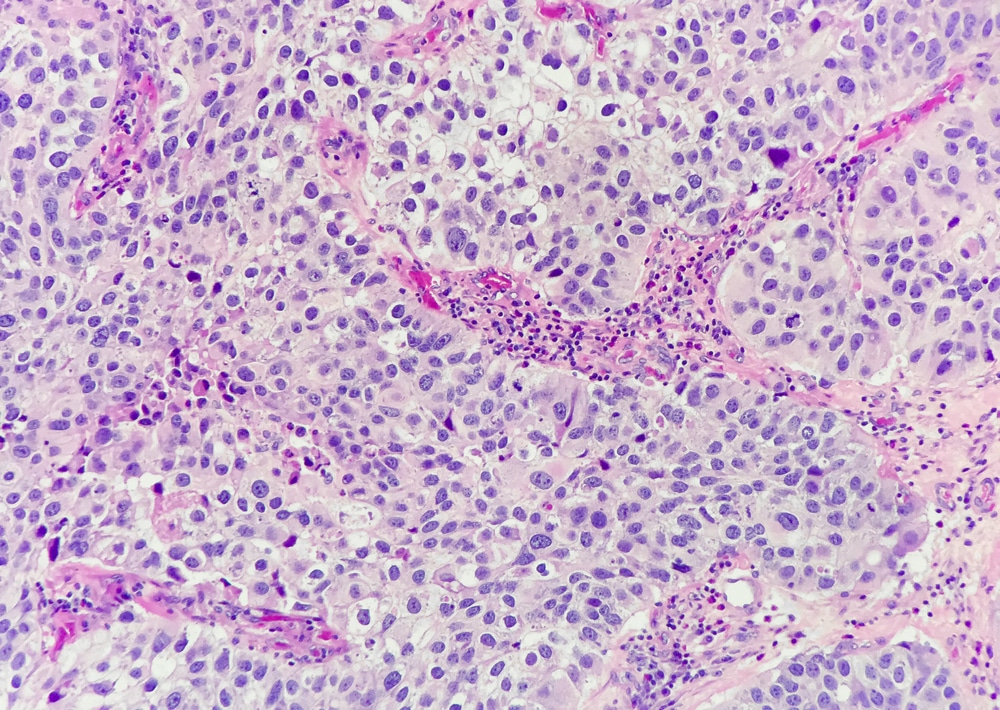Newsletter Signup - Under Article / In Page
"*" indicates required fields
Astellas Pharma Inc., Seagen Inc. and Merck (known as MSD outside of the U.S. and Canada), have announced results from the phase 1b/2 EV-103 clinical trial (KEYNOTE-869) Cohort K investigating PADCEV (enfortumab vedotin-ejfv) in combination with Merck’s anti-PD-1 therapy KEYTRUDA (pembrolizumab) and PADCEV alone as first-line treatment in patients with unresectable locally advanced or metastatic urothelial cancer (la/mUC) who are ineligible to receive cisplatin-based chemotherapy.
The findings were presented at the European Society for Medical Oncology (ESMO) Congress as part of a late-breaking abstract presentation.
In patients treated with enfortumab vedotin and pembrolizumab, results demonstrated a 64.5% confirmed objective response rate (ORR), with 10.5% of patients experiencing a complete response and 53.9% of patients experiencing a partial response.
The median duration of response (DOR) per BICR was not reached. All-grade treatment-related adverse events (TRAEs) of special interest for enfortumab vedotin in combination with pembrolizumab were skin reactions (67.1%), peripheral neuropathy (60.5%), ocular disorders (dry eye, blurred vision, and corneal disorders) (26.3%), hyperglycemia (14.5%), and infusion-related reactions (3.9%).
Consistent with previous reports
Pembrolizumab adverse events of special interest were consistent with previously observed safety data from monotherapy with the exception of severe skin reactions. Overall, the results were generally consistent with previously reported efficacy and safety results of the EV-103/KEYNOTE-869 dose-escalation cohort and expansion Cohort A.
Cohort K also included a monotherapy arm in which patients were treated with enfortumab vedotin alone, although this study was not designed to support a formal comparison between the two arms. Results showed a 45.2% confirmed ORR, with 4.1% of patients experiencing a complete response and 41.1% of patients experiencing a partial response.
All-grade TRAEs of special interest for enfortumab vedotin were peripheral neuropathy (54.8%), skin reactions (45.2%), ocular disorders (dry eye, blurred vision, and corneal disorders) (28.8%), hyperglycemia (11.0%), and infusion-related reactions (5.5%).
Secondary endpoints
Additional secondary endpoints in the EV-103 Cohort K trial included progression-free survival (PFS) and overall survival (OS). Among patients treated with enfortumab vedotin and pembrolizumab, median PFS was not reached. Median OS was 22.3 months. Among patients treated with enfortumab vedotin, median PFS was 8.0 months (95% CI: 6.05 to 10.35) and median OS was 21.7 months (95% CI: 15.21 to NR).
TRAEs of any grade that occurred in more than 20% of patients treated with enfortumab vedotin alone or in combination with pembrolizumab were fatigue, peripheral sensory neuropathy, alopecia, rash maculo-papular, pruritus, dysgeusia, weight decreased, diarrhea, decreased appetite, nausea, and dry eye.
“Results from EV-103/KEYNOTE-869 Cohort K support the ongoing investigation of enfortumab vedotin and pembrolizumab in cisplatin-ineligible patients with locally advanced or metastatic urothelial cancer who are in need of treatment options, and this combination may be an important therapeutic option for these patients,” said Jonathan E. Rosenberg, chief, genitourinary medical oncology service, Division of Solid Tumor Oncology, and Enno W. Ercklentz, chair, Memorial Sloan Kettering Cancer Center and EV-103/KEYNOTE-869 Cohort K primary investigator.
Rosenberg has consulting relationships with Astellas, Seagen and Merck.
Involving regulatory authorities
“We’re encouraged by these positive findings from the combination of enfortumab vedotin and pembrolizumab in people with advanced urothelial cancer who historically have had limited treatment options in the first-line setting, and we intend to discuss these results with regulatory authorities,” said Ahsan Arozullah, senior vice president and head of development therapeutic areas, Astellas.
“Nearly 65% of patients who were treated with enfortumab vedotin and pembrolizumab responded to the combination, with almost 11% showing no detectable cancer following treatment. These study results represent an encouraging finding for people with advanced urothelial cancer who are not eligible for cisplatin treatment,” said Marjorie Green, senior vice president and head of late stage development, Seagen.
“We’re pleased that this combination provided a meaningful benefit to this group of advanced bladder cancer patients in this study, and we will continue to investigate enfortumab vedotin plus pembrolizumab through our collaboration,” said Eliav Barr, senior vice president, head of global clinical development and chief medical officer, Merck Research Laboratories.
- Breakthrough Therapy
In February 2020, the U.S. Food and Drug Administration (FDA) granted Breakthrough Therapy designation for enfortumab vedotin in combination with pembrolizumab for patients with unresectable la/mUC who are ineligible to receive cisplatin-based chemotherapy in the first-line setting.
The designation is based on results from the dose-escalation cohort and expansion Cohort A of the phase 1b/2 trial, EV-103/KEYNOTE-869, evaluating patients with la/mUC who are ineligible to receive cisplatin-based chemotherapy treated in the first-line setting with enfortumab vedotin in combination with pembrolizumab.
Further investigation between Astellas, Seagen and Merck
Astellas, Seagen and Merck are further investigating enfortumab vedotin plus pembrolizumab in phase 3 studies, including EV-302/KEYNOTE-A39, which is intended to confirm these results for the investigational treatment combination in previously untreated la/mUC and in muscle-invasive bladder cancer in EV-304/KEYNOTE-B15 and EV-303/KEYNOTE-905.
About bladder and urothelial cancer
It is estimated that approximately 83,730 people in the U.S. were diagnosed with bladder cancer in 2021. Urothelial cancer accounts for 90% of all bladder cancers and can also be found in the renal pelvis, ureter and urethra. Globally, approximately 573,000 new cases of bladder cancer and 212,000 deaths are reported annually.
Oncology R&D trends and breakthrough innovations







